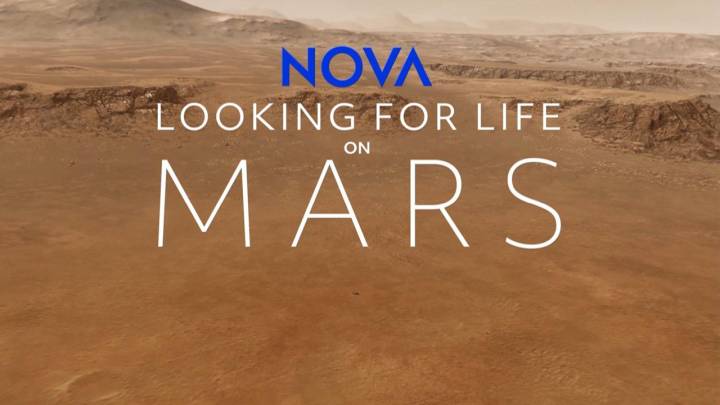
LOOKING FOR LIFE ON MARS, a one-hour special from the PBS science series NOVA, a production of GBH Boston, will follow NASA’s Mars 2020 mission – perhaps the most ambitious search yet for traces of ancient life on the red planet. The special premieres Wednesday, February 24 at 9 p.m. ET/8C on PBS and will be available for streaming online and on the PBS video app.
On February 18, a NASA spacecraft carrying the Perseverance rover blazed into the Martian atmosphere at some 12,000 miles per hour and lowered Perseverance into the rocky Jezero crater, home to a dried-up river delta scientists think could have harbored life. Now safely landed, Perseverance will comb the area for signs of life and collect samples for possible return to Earth. Some 130 million miles away, back on Earth, the mission’s thousands of scientists, researchers, and engineers watched and waited on tenterhooks – would the spacecraft to which they devoted years of work survive this crucial test? NOVA’s LOOKING FOR LIFE ON MARS brings viewers an exclusive behind-the-scenes look at this high-stakes mission to the red planet – one that hopes to answer the age-old question “Are we alone?”
Not only have NOVA’s cameras been following the mission since May 2019, but the film will also capture the mission’s latest developments: LOOKING FOR LIFE ON MARS will include still images from Perseverance’s February 18 arrival on Mars, released by NASA following the landing. It will also feature footage of reactions to the landing inside NASA’s mission control and interviews with key members of the Mars 2020 mission team, including Massachusetts Institute of Technology geobiologist and Project Science Group member Tanja Bosak; Planetary Protection Engineer Moogega Cooper; System Testbed Engineer Elio Morillo; Mission Lead Diana Trujillo; and Mechanical Engineer Aaron Yazzie.
“Scientists have been searching for life on Mars for decades, from the Viking missions of the 1970s to the Curiosity rover – whose discoveries set the stage for the Mars 2020 mission,” said producer Terri Randall of Randall Productions. “Despite the enormous challenges, thousands of scientists and space explorers across the globe came together with the single goal of finding answers to a fundamental question about our place in the universe. Their commitment to discovery and exploration is incredibly inspiring, and we are excited to share it with NOVA viewers.”
LOOKING FOR LIFE ON MARS captures both the astounding innovation and painstaking work that has gone into making this mission possible. The film traces the remarkable development of Ingenuity, the small helicopter accompanying Perseverance that could revolutionize the future of space exploration. We also meet MOXIE, the device designed to produce oxygen from the Martian atmosphere, in hopes that a similar system could be used to create fuel – or air for humans to breathe – on future missions. What MOXIE finds will offer crucial information about whether humans could survive on Mars.
One of the mission’s most impressive innovations is Perservance’s one-of-a-kind sampling system, which took seven years to design, test, and build. Because the rover is not equipped to verify ancient Martian microbes, the samples it collects will have to be studied back on Earth – and any contamination could ruin the samples’ integrity. LOOKING FOR LIFE ON MARS takes viewers inside the mission’s clean room – the highly sterile space where a team ensures that the rover and the sampling system are free of earthly microbes: Over the course of the mission, they took 16,681 wipes, swabs, and air samples of the spacecraft and the surrounding environment.
With five months to go until launch day, the COVID-19 pandemic hit, forcing unexpected shutdowns and delays that put the mission in jeopardy of missing its launch window. NOVA’s cameras capture the team’s Herculean effort to pull through the crisis, including the emotional, nerve-wracking launch day itself. “I can’t describe how excited and scared and nervous I am at the same time,” System Testbed Engineer Elio Morillo tells the cameras as he watches the launch – his first ever – with friends and family.
“Not only did this team put together the most sophisticated Mars mission to date, but they also successfully launched the spacecraft on time amid a global pandemic,” said NOVA Co-Executive Producer Julia Cort. “LOOKING FOR LIFE ON MARS is an exhilarating and wide-ranging look at this groundbreaking mission and the remarkable science and engineering developed in our quest to find life beyond Earth.”
LOOKING FOR LIFE ON MARS will also be accompanied by a new installment of NOVA Labs, the free digital platform that engages teens and lifelong learners in games and interactives that foster authentic scientific exploration. The Exoplanet Lab takes players beyond our solar system on a hunt for planets orbiting faraway stars that could be home to intelligent life. The Lab begins with a training module that helps players understand the conditions that make Earth so conducive to life – and what to look for in other, distant star systems in our Milky Way galaxy. Through a series of tasks modeled on the work of real-world scientists, players then embark on a series of missions to find suitable new homes for fictional alien species looking to relocate.
The Exoplanet Lab is part of the National Science Foundation-funded WHIMC project (What-If Hypothetical Implementations in Minecraft), based at the University of Illinois at Urbana-Champaign. WHIMC uses Minecraft as a creative sandbox in which kids can explore alternative versions of Earth – like “What if Earth had no Moon?” – allowing researchers to study how “What If?” hypothetical scenarios might trigger engagement and learning in STEM. Exoplanets provide a fantastic playground for this kind of learning, offering students a chance not just to ponder what alien worlds and their inhabitants might be like, but to use proven scientific methods to find answers.
LOOKING FOR LIFE ON MARS is a NOVA Production by Terri Randall Productions for GBH Boston in association with Arte France and NHK. Executive Producers for NOVA are Julia Cort and Chris Schmidt. NOVA is a production of GBH Boston.
Original funding for LOOKING FOR LIFE ON MARS was provided by Draper, the David H. Koch Fund for Science, the NOVA Science Trust with support from Margaret and Will Hearst, the Corporation for Public Broadcasting, and PBS viewers.

![“In Snooki We Trust” – Nicole “Snooki” Polizzi Heads North in New Series, “Canada Shore” [VIDEO]](https://mortystv.com/blog/wp-content/uploads/2026/01/In-Snooki-We-Trust-350x250.webp)
![Official Roku Channel Trailer for “On the Edge with Juanpa” [VIDEO]](https://mortystv.com/blog/wp-content/uploads/2026/01/On-the-Edge-with-Juanpa-350x250.webp)
![Official Netflix Trailer for “One Piece” Season 2 [VIDEO]](https://mortystv.com/blog/wp-content/uploads/2026/01/one-peice-350x250.webp)
![Nominees Announced for the “57th NAACP Image Awards” Airing Live from the Pasadena Civic Auditorium Saturday, February 28th at 8 PM ET/ 8 PT on BET and Simulcasting on CBS [VIDEO]](https://mortystv.com/blog/wp-content/uploads/2026/01/57th-NAACP-Image-Awards-feat-350x250.jpg)
![A Historic Fan-Powered Celebration: “Survivor 50 Challenge” Grand Prize Revealed [VIDEO]](https://mortystv.com/blog/wp-content/uploads/2026/01/survivor-50-joinin-feat-350x250.webp)
![Official Prime Video Teaser for “The Bluff” [VIDEO]](https://mortystv.com/blog/wp-content/uploads/2026/01/the-bluff-350x250.webp)


